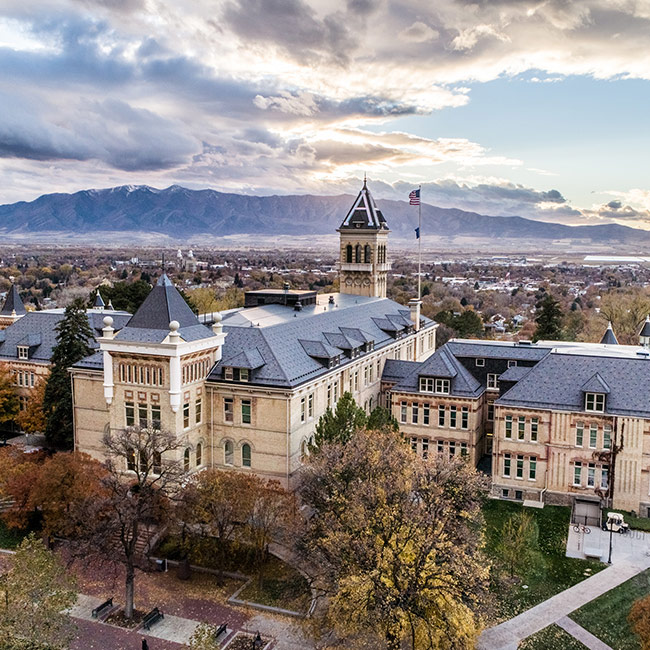About This Degree
The master’s program in geography is centered on exploring how the geographic perspective informs our understanding of human-environment relationships.
Broadly, geographers are concerned with the relationship between people and place and why place matters, the spatial patterns of human activity across the earth and the processes underlying those patterns, and the linkages among places in a globalizing world.
Formed in 2002, the Department of Environment and Society is the first of its kind in a college of natural resources in the country and has served as a model for the development of similar departments at other institutions of higher learning.
What You Will Learn
Geography is a diverse field, covering a wide range of issues, including the social aspects of natural resource management and conservation, land-use and environmental change, international and rural development, map making, planning, natural disaster response, and more.
The geography degree combines technical training in geographic/information systems, remote sensing, and quantitative and qualitative analysis with the study of the human-environment relationship.
Specialization:
Climate Adaptation Science (Geography MS):
The Climate Adaptation Science specialization provides students with experiences in actionable science through internship and research experiences. Program includes interdisciplinary research to identify adaptive responses to changing climate extremes and two-part internships with agency, NGO, and industry partners. In a first internship, students contribute to projects and learn the workplace cultures and science needs of the host. The internship experiences inform interdisciplinary climate adaptation research by student teams. In a second internship, students share science results and tools with the host organization and help put that science into action.
ADVISING
At a Glance
College: S.J. & Jessie E. Quinney College of Natural Resources
Department: Environment and Society Department
USU Locations:
- Logan campus
Program Requirements
Career And Outcomes
Career Opportunities
Graduates can work in the following areas:
- GIS specialist
- Natural resource management
- International conservation
- Non-profit/non-governmental organization work
- Education
- Planner
- Cartographer
- Environmental consulting
- International development
Job Outlook
USU Locations

LOGAN CAMPUS
Admission
Admission Requirements
Applicants from various undergraduate backgrounds may be considered. Depending on the student’s desired area of research, certain prerequisite courses may be required.
To be accepted to the program, it is recommended that applicants first contact a specific faculty member with whom they are interested in working. If the faculty member is accepting graduate students and agrees to work with the student, the student can then apply by completing the following application requirements:
Application Requirements:
- Complete the online application
- Pay the $55 application fee
- Score at or above the 40th percentile on in the GRE
- Have a 3.0 or higher GPA on your last 60 semester or 90 quarter credits
- Provide transcripts of all college/university credits
- Provide three contacts for letters of recommendation
International students have additional admissions requirements.
Deadlines
The department has the following deadline:
- Fall semester – February 15
The degree programs in the Department of Environment and Society have rolling admission, meaning the department will continue to consider and accept applications until the program is full. The time it takes to process an application is primarily dependent on the speed with which the School of Graduate Studies receives letters of recommendation, transcripts, and test scores. For most students, this process may take six to eight weeks. Applicants should plan accordingly.
Plan Options
Students can receive the MS by pursuing one of two options:
- In the Plan A option, students complete graduate-level coursework and must write a thesis.
- The Plan B option requires the production of a paper or creative work of art and is expected to reflect equivalent scholarship standards as a thesis.
Financial Aid
The Department of Environment and Society provides funding for most of its graduate students through research assistantships, available through professors having contracts, grants, or other awards.
A variety of funding opportunities are available on the graduate school website.
Take The Next Step
How to Apply
View our step-by-step guide on how to become an Aggie.
Request Information
Contact the School of Graduate Studies to ask questions or receive more information.
Cost and Funding
Calculate the cost of graduate school and learn about funding opportunities.
You May Also Be Interested In

Environment and Society
Learn how human activities affect the natural environment and help make changes in policy, land management, and human behavior to reduce society’s impact on the natural world.

Geographic Information Science (GIS)
Develop skills and experience applying industry standard GIS and remote sensing tools to natural resource issues.

Master of Natural Resources
Earn a master’s as a working professional as you take courses to help you become a manager and decision maker in the natural resources field.

Recreation Resource Management
Earn a degree at a university with six national parks close at hand as you prepare to manage outdoor recreation settings.

